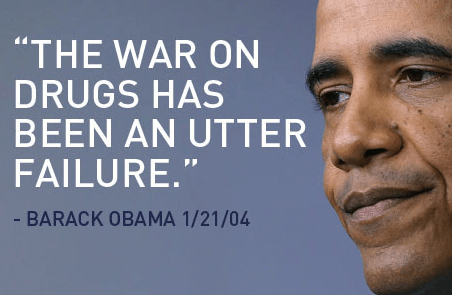Make the faces of drug use and abuse white ones. Interesting, yes? Most black and brown people have known this since forever. Last week, the WaPo published two authors who note that with the reports of the explosion of heroin use and abuse in the suburbs, that the news reporting as well as law enforcement sound much more compassionate, but that seems to be because they are now talking about white people:
Last month, NBC News ran a series of stories about the United States’ “growing heroin epidemic.” Two things stand out in the reports: One is their sympathetic tone; the other is that almost everyone depicted is white.
Drug users and their families aren’t vilified; there is no panicked call for police enforcement. Instead, and appropriately, there is a call for treatment and rehabilitation. Parents of drug addicts express love for their children, and everyone agrees they need support to get clean.
The War on Drugs was always a mistake and always doomed to failure. People struggling with drugs ALWAYS needed treatment options, not just jail. Of course, those who are committing crimes other than just possession (like breaking into cars and houses) should get some jail time. But abusing and possessing should be a health problem, not a justice system problem:
Clearly, new attention to heroin use in white, affluent areas is changing the perceptions and politics of drug addiction. No longer are the addicts “desperate and hardened.” Apparently, heroin use isn’t the result of bad parenting, the rise of single-parent families or something sick or deviant in white culture. It isn’t an incurable plague that is impossible to treat except with jail time. Drug addicts no longer are predatory monsters.
Interesting, right? I’ve certainly noticed that as heroin in the suburbs becomes a bigger problem, you never hear the usual avenues of blame directed a black and brown families directed to these middle-class white families. No problems with white “culture” or lack of parenting capability or single mothers or whatever else white folks like to rationalize the need for the War on Drugs. Once the drug problem hits the kids their kids go to school with, compassion is more the order of the day — making the case for a more compassionate approach that includes treatment and care that all of that potential isn’t just thrown away.
You can’t help but wonder how the story of a black teacher in an inner-city school shooting drugs in the school bathroom would be characterized. Or how the heroin addiction of a single black mother with two sons would be depicted on the nightly news.
Actually, we don’t have to wonder: We know exactly how drug use has been depicted and responded to when it was perceived chiefly as a problem in communities of color. The 1973 Rockefeller drug laws in New York mandated a minimum sentence of 15 years to life in jail for selling two ounces or possessing four ounces of heroin. The federal government followed suit in the 1980s with mandatory minimum sentencing as part of its “war on drugs.”
Yeah. Well. We already know that we live in a country where some lives are worth more than others and the War on Drugs is one of the most racist policies ever enacted. Drug abuse is a real problem all over the US. I’ve already mentioned how Oxy, meth and heroin is a massive problem in a very white rural community in Minnesota where one of my best friends lives. You rarely hear the contempt for their own having issues with drugs that they will freely express for drug issues in the Big City. Yet drug abuse doesn’t know from your race — it just needs some compassion to help these folks manage this issue. Pathways to treatment — not pathways to jail (at least for those not involved with other criminal incidents). For EVERYBODY, not just the white ones.
